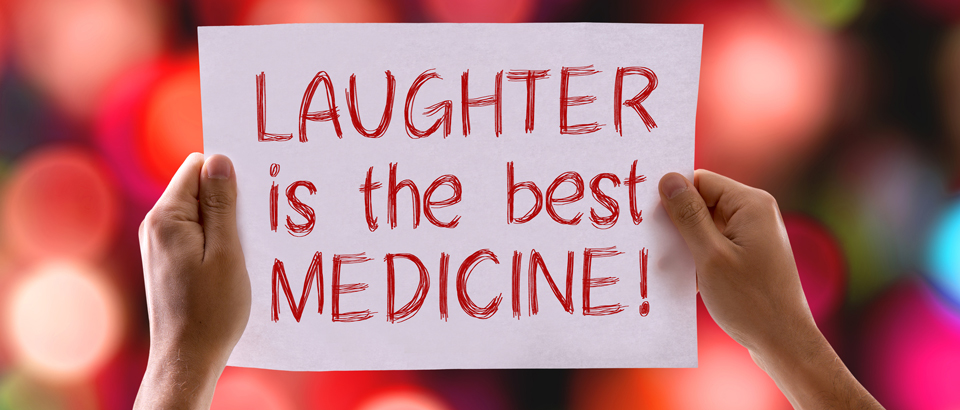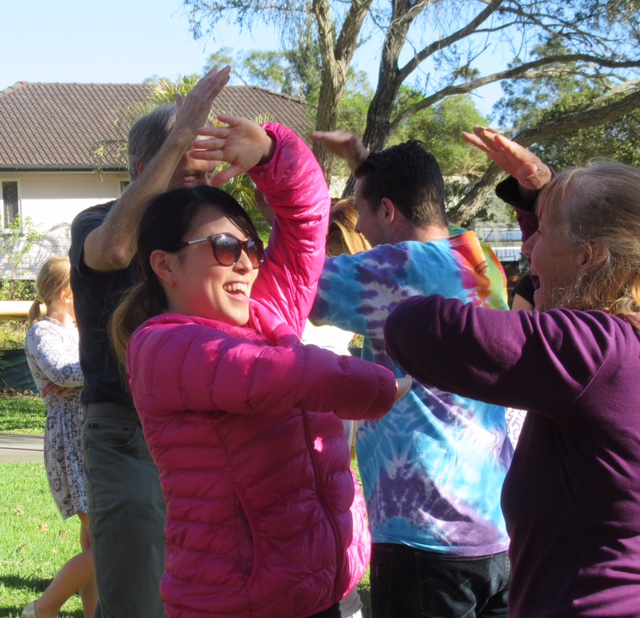Is laughter yoga therapy?

Laughter is the best medicine, right? As a professional laughter wellbeing facilitator and certified laughter yoga teacher, I’m often asked: Do you deliver laughter therapy?
My answer isn’t a straight ‘yes’ or ‘no’ and here’s why.
‘Therapy’ is any treatment intended to relieve (or heal) a disorder.
Something that is ‘therapeutic’ can be in the form of a treatment, an exercise (or a drug).
A ‘therapeutic exercise’ can improve symptoms and quality of life.
What happens in laughter yoga?
 A typical laughter yoga session lasts between 30 and 60 minutes. It begins with warm-up exercises that include gentle stretching, clapping and chanting, progresses to a series of playful laughter exercises combined with deep slow breaths, and ends with a relaxation technique.
A typical laughter yoga session lasts between 30 and 60 minutes. It begins with warm-up exercises that include gentle stretching, clapping and chanting, progresses to a series of playful laughter exercises combined with deep slow breaths, and ends with a relaxation technique.
Laughter yoga promotes breathing activities in-between laughter exercises. This is very important because when you deepen your breath, you calm both your body and mind.
What’s more, when you laugh out loud, the mechanics of laughing forces more stale air out of your lungs, requiring deeper replenishment.
The brain doesn’t differentiate whether a laugh is intentional (‘fake’) or natural—when the person laughing does it willingly: the uptake of feel-goods will be the same.
Is laughter yoga good for me?
Some benefits of laughter yoga can be felt in the first session: you may feel uplifted or peaceful. I liken it to that ‘holiday feeling’. Lasting benefits come, as with any exercise or therapy, from repeated practice.
Laughter yoga is an effective method to banish blues, allay anxiety, defuse anger, soothe stress and generally refocus thinking. I liken it to a positivity switch that’s flicked on. It’s also a form of mindfulness. When you are laughing, you are in the ‘now’, not stewing about the past or agonising about the future. Laughter yoga’s other health-giving benefits include strengthening the immune system and reducing pain.
So laughter yoga is only for people who are sick?
Does this mean laughter yoga is only for those who have depression, anxiety, or another mental or physical health disorder? Absolutely not! It does mean you don’t need to be in the mood to do it. Laughter yoga is for all ages, and all abilities. Many people use it as a preventive strategy to strengthen their wellbeing.
Is laughter yoga therapy?
Do I deliver laughter therapy? I am not an allied health professional, trained or registered with AHPRA as a therapist. I am a certified laughter yoga teacher, qualified to lead people in unconditional laughter using a fun, effective technique.
The experience of what’s delivered, while personal, is invariably joyful, playful and uplifting. Many say it’s ‘therapeutic’.
Ultimately, only you can decide if laughter yoga is truly therapeutic and whether a session, for you, is laughter therapy: I suggest you try a DOSE of natural laughter wellbeing and make your own mind up.
(c) 2019 Heather Joy Campbell
Founder of The Happydemic Heather Joy Campbell is a sought-after professional facilitator of laughter wellbeing delivered in workplaces, aged care centres and community groups in Brisbane, Australia. A global ambassador of laughter yoga, she trains others in the practice, spreading a happydemic of wellbeing throughout Queensland. On Saturdays, she’ll be found volunteering at her local ‘laughter club’.